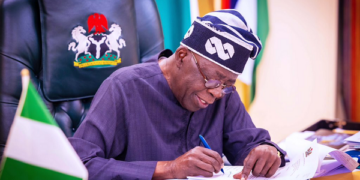- Tinubu appreciates the UN’s efforts but encourages them to provide more substantial support
- He underscores terrorism’s threat to democracy and development
- Tinubu emphasizes the importance of understanding the “where, how, and when” of terrorism
President Bola Tinubu has called upon the United Nations to lend its assistance to Nigeria in combating terrorism due to its far-reaching impact on global stability, displacement of individuals, and the surge in poverty levels.
During a meeting with Vladimir Voronkov, the undersecretary general of the United Nations Office on Counter-terrorism, at the State House on Thursday, President Tinubu emphasized that terrorism has persistently impeded developmental progress and exacerbated instability within households and communities. He urged the UN to adopt a more steadfast approach in addressing this issue within the context of developing nations.
“We appreciate all that you have been doing. We know in the face of many demands and challenges, you can still do much better. We can score you ‘A’ in collaboration but ‘B’ in physical support,” stated Mr Tinubu. “You have to do more because terrorism is an effective danger to democracy; terrorism is also an effective danger to development. Growth and prosperity cannot be achieved until we banish terrorism.”
Mr Tinubu added, “We have to equally look at other sides of the issue, and I have said it is the where, how and when of terrorism.”
The Nigerian leader said global peace and prosperity would demand the swift and comprehensive provision of the right answers to the challenge posed by insurgencies in parts of the world.
“We must take into account the basic needs of our people. If out of the meagre resources presently available, we have to dip our hands without the steady support from organisations like the UN, then we are in trouble,” Mr Tinubu stressed.
Foreign affairs minister Yusuf Tuggar highlighted poverty and injustice as drivers of insurgency.
“Nigeria continues to make significant investments in education and social security,” said Mr Tuggar.
Mr Voronkov commended Nigeria’s contributions toward global counter-terrorism efforts. He said Nigeria already had a framework for prevention, mitigation and reconciliation, adding that the efforts have been valuable in tackling terrorism.
“Of course, terrorism is part of the international agenda, and we had successful meeting with the minister of foreign affairs, discussing how to enrich our agenda on international terrorism response,” stated Mr Voronkov. “I can only mention that politically, and from the point of view of capacity building on activities for counter-terrorism, Nigeria is one of the leading partners.”
Mr Voronkov told the Nigerian resident that the UN was planning a counter-terrorism summit in Abuja slated for April 2024. African nations would largely drive it with an African agenda, he said.










Discussion about this post